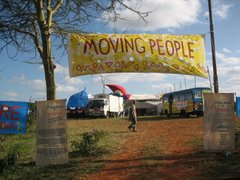and more commerically exploited. Newpaper articles and online reports about voluntourism and voluntourists have surely increased in recent months.
A short query shows this. Publications like desertnews conclude in April this year conclude "that consumers are becoming more interested in vacations with a voluntarism aspect".
Also the LA Times observes that "Whatever the reason, more tourists — such as college students on spring break, jet-setting luxury travelers and retiring baby boomers — are using their vacations to volunteer". Whatever the reason....well, we want to know.
The recent surge in interest in voluntourism goes back to the Tsunami Catasrophy in Thailand in Winter 2004 that triggered the involvement of tourists into relief efforts. What initially was a spontaneaus reaction of travelers and tourists to help in a situation of need soon transformed into a new form of organized travel. The NGO Tsunami Volunteer Centre (TVC) in Thailand provides an example of this process.
Even before the hype that the theme of voluntourism experienced, academic research has approached voluntourism. After serveral empirical studies, Stephen Wearing wrote a book about the voluntourism in 2001 in which he assumed that voluntourists are developing their selves in their practise. A little later Sally Brown and Xinran Letho discussed that there we two different tendencies in the term Voluntourism, one sifginifing the fact that volunteer work often involved travel, the other that travel sometimes, and as they argued increasingly, involved a bit of volunteer work. (Brown and Letho 2005) This second tendency can also be described as a commericalization of the voluntourism. Brown and Letho are entirely optimistic about this new development. They imagine the implementation of elements of volunteering into mainstream tourism will "create authentic cultural experiences unlike any other in the industry" while "enabling every traveller to become an embassador of peace". But they open little room for the reflection of historical continuity of international charity practises in western culture. Methodologically their focus on the travellers involved in the practises ignores the reflection of the larger political economy in which tourism is taking and creating place. The commercialaztion of an individual desire to do good might provide a satisfying experience for both the traveller and the industry. Yet the local impact, the reaction of local participants in the exchange remains unreflected. Importantly than in the study of Voluntourism should focus on the bio-political production of subjectivities, the systems of assistance and dependence that evolve and how "meaningful" international travel exists in both a historical and contemporary international system of post- and neo-colonial powerstructures. A more critical approach to Voluntourism is indeed needed.
Wednesday, 23 May 2007
Informal Economies
We focus on aspects of the exchange taking place in tourism outside the frameworks of formalized regularization, for example public and private law.
Mission Statement
Issues of global distribution, social justice and environmental concern increasingly surround international tourism and travel. Not only are such issues defining new forms of tourism, they are also shaping far more fluid patterns of production and consumption. Processes of regulation, rationalisation and re-structuring are being re-cast in line with the highly complex and dynamic formation of informal structures, communicative practices, junctures and ruptures in a touristic world that escapes modernist notions of political economy. Destinations are being defined beyond the material notions of the nation-state, traditional mobilities are being challenged, motivations tested, and new forms of exchange are emerging in line with inter-and intra generational ethical thinking, and alternative political approaches to development.
A new weblog, based at the Centre for Tourism and Cultural Change (CTCC) at Leeds Metropolitan University, has been devised to interrogate the ‘new economics of tourism’ (N.E.T) – to transcend the narrow boundaries of contemporary tourism economics. N.E.T is a tool for networking and exchange between scholars and students reflecting on aspects of the new economics of tourism. From the operation of informal economies in tourism, to the alternative economics of exchange in ‘Volun-tourism’; from film and digital media’s post-geographical definition of destinations, to the individual bargaining of loss and gain in the expectation and practice of the journey, and the role of dreamscapes and virtual worlds in the tourist exchange, N.E.T seeks to provide a forum to explore original, alternative and challenging practices of, and approaches to, global tourism in the material, intangible and symbolic sense.
Contributions are invited from an international, multi-disciplinary range of scholars and institutions. N.E.T provides a convenient and illuminating proximity of breaking international news and lasting reflections on the issues addressed and serves as a global networking tool and as a resource for stakeholders in the expanding field of exchange and transformation that characterises global tourism. Proposals to contribute and participate are welcome.
A new weblog, based at the Centre for Tourism and Cultural Change (CTCC) at Leeds Metropolitan University, has been devised to interrogate the ‘new economics of tourism’ (N.E.T) – to transcend the narrow boundaries of contemporary tourism economics. N.E.T is a tool for networking and exchange between scholars and students reflecting on aspects of the new economics of tourism. From the operation of informal economies in tourism, to the alternative economics of exchange in ‘Volun-tourism’; from film and digital media’s post-geographical definition of destinations, to the individual bargaining of loss and gain in the expectation and practice of the journey, and the role of dreamscapes and virtual worlds in the tourist exchange, N.E.T seeks to provide a forum to explore original, alternative and challenging practices of, and approaches to, global tourism in the material, intangible and symbolic sense.
Contributions are invited from an international, multi-disciplinary range of scholars and institutions. N.E.T provides a convenient and illuminating proximity of breaking international news and lasting reflections on the issues addressed and serves as a global networking tool and as a resource for stakeholders in the expanding field of exchange and transformation that characterises global tourism. Proposals to contribute and participate are welcome.
Subscribe to:
Posts (Atom)
